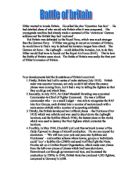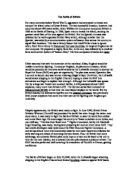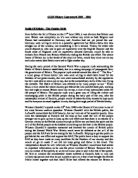Suppression of the British air force would have been the first difficult step to a German victory, but it was not the only factor, and the British would have found they had plenty more tricks up their sleeve. There was nothing to stop them from withdrawing their aircraft northwards, out of range of the German fighters, if they started to lose the air battle, keeping the aircraft in reserve to counter an attempted German invasion.
The combatants
There were plenty of indications that the Luftwaffe might face real problems in accomplishing their initial step towards the conquest of Britain. The first came during the evacuation of Allied troops from the Dunkirk beaches at the end of May.
The Luftwaffe's principal modern fighter, the Messerschmitt Bf109E (Me-109), had limited range and was operating from bases some way from Dunkirk, making the German bombers very vulnerable to the most modern RAF fighters. This was a foretaste of the problems that they would soon face over Britain itself, and during the operation they lost 240 aircraft to the RAF's 177. German loss in the Battle of France was also heavy - 30 per cent - and the German aircraft industry was already falling behind the Allies in aircraft production.
A plan to use the Luftwaffe as the prelude to the invasion of the UK had been discussed in 1939, and was at first rejected. However, in view of the strength of the Royal Navy, the Germans did eventually decide they had to eliminate the RAF first. They had won convincingly in the Polish campaign in 1939, and the Scandinavian and French campaigns in 1940, but they were now up against a well-organised air defence system, and things were going to be more difficult for them. Furthermore, they were operating at the limit of the range of the fighters needed to protect their vulnerable bombers.
Another factor counting against a German success was their underestimation of the strength of the RAF and the British aviation industry's production capacity. They believed they could eliminate RAF Fighter Command in four days and the aviation industry in four weeks.
The British, on the other hand, over-estimated German strength and competence. This was worrying, but not something that would lose them the battle, and they also had a new invention - radar - to help direct the fighters to intercept attacking German aircraft. Furthermore, the British were starting to get intelligence from intercepting German communications, having cracked the Enigma code system.
Thus, in the struggle for air superiority, the two sides were about evenly matched. All the German aircraft had first seen action in the Spanish Civil War. The Me 109E was the principal German fighter. However, with a range of 700 km, it had only 15 minutes' fuel over Kent and was at the limit of its range over London. The two-engined Me-110 had a slightly longer range.
The Germans used relatively fast two-engined medium bombers - the Dornier 17, the Junkers 88 and the Heinkel 111, as well as the gull-winged Junkers 87 'Stuka', which was very effective in direct support of the army but proved extremely vulnerable to the RAF.
The RAF's high performance fighters were the Hawker Hurricane, the mainstay of its effort, and the Supermarine Spitfire. The Spitfire was faster and more manoeuvrable but the Hurricane carried slightly more ammunition, was a more stable gun platform, and was absolutely lethal against the German bombers.
At the time, these aircraft were the best the respective sides could produce. Had the Germans had the Focke-Wulf 190 in their armoury - it was eventually introduced in mid 1941 - that might have made a real difference. The Germans had no heavy four-engined bomber of the type being developed by the British and US. These bombers were used in the great Allied bombing offensives later in the war.
The Battle of Britain began on 30 June 1940. Reichsmarschall Hermann Göering, head of the Luftwaffe, ordered his force to draw the RAF into battle by attacking coastal convoys and bombing radar stations along the south coast, installations of the British aircraft industry, and RAF airfields. This dilution of effort, which became more marked as the battle progressed, was one of the principal reasons why the Luftwaffe eventually lost the battle.
The short range of the German aircraft and the fact that they were fighting over enemy territory were two major disadvantages for the Germans. A downed German pilot was lost to Germany, and a damaged aircraft was likely to ditch in the sea - whereas damaged RAF aircraft could limp home, or land somewhere friendly, and downed RAF pilots parachuted onto English fields. They were returned to their units almost immediately, not infrequently after a spell in the pub.
The head of the British fighter command since 1937 was Air Chief Marshal Sir Hugh Dowding, who had been involved in the procurement of both the Spitfire and the Hurricane aircraft, and in the development of radar.
He had resisted demands by Churchill to send his fighter reserve to France, holding it back for the defence of the UK, and refused to commit it in large numbers to defending sea convoys. Both decisions were subsequently proved to have been good ones, but Churchill resented Dowding's independence of mind.
The Battle officially began on 13 August, with an all-out assault on Adlertag ('Eagle day'). Five waves of bombers and fighters were sent against nine airfields - from Eastchurch to Portland. At times the Luftwaffe threatened to overwhelm the Kent and Sussex sectors, but airfields were rapidly repaired and there was a continuous flow of replacement aircraft and pilots.
Many of the pilots were from Australia, Canada, New Zealand, South Africa and from central European countries overrun by the Germans, in particular Poland and Czechoslovakia. The experienced Polish and Czech squadrons achieved a better kill ratio against the Germans than the British squadrons.
The Luftwaffe lost a total of 1,733 aircraft from July to October, the RAF 915. The Germans were actually winning the battle of attrition but, frustrated by the unexpected numbers of Allied planes opposing them, switched in early September to night bombing of cities. This was a fatal mistake. The earlier dilution of effort was made worse as the Luftwaffe wandered between attacks on transport, civilian morale and the aviation industry.
The Blitz, as it was known, continued after the Battle of Britain had finished. During the Blitz, between September 1940 and May 1941, the Germans dropped more than 35,000 tons of bombs for the loss of 650 aircraft. London was attacked 19 times with 18,800 tons of bombs.
The RAF defence was well organised. The brunt was borne by 11 Group, covering Kent and Sussex. Radar would pick up an approaching force and relay the information to a sector airfield, which in turn passed it to 11 Group HQ at Northolt. The Group would inform Fighter Command and, if appropriate, bring in aircraft from other sectors.
Switching to attacks on London took the German fighters to the limit of their range and brought them within range of 12 Group, defending the Midlands. The switch to city bombing also allowed Fighter Command to recover.







